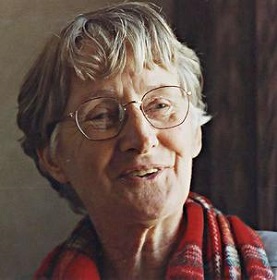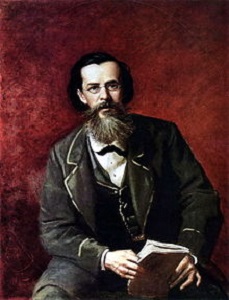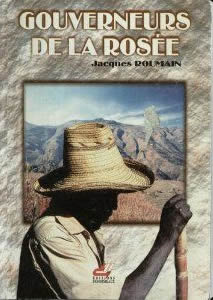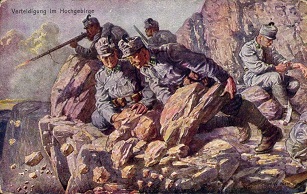De Duitse schrijfster Dana Bönisch werd geboren op 4 juni 1982 in Frechen. Zie ook alle tags voor Dana Bönisch op dit blog.
Uit: Rocktage
„An den guten Tagen ging Puck zwischen den Leuten hindurch und konnte in ihre Seelen sehen und begriff ansatzweise die tausend Welten, die zwischen Neu-markt und Roncalliplatz parallel existierten, und er sah ganz deutlich einzelne Federn im Gefieder von schmut-zigen Vögeln, und er sah den fallenden Wassertrop-fen, und er sah Multivitaminbonbons in Mündern ver-schwinden, und er schrieb im Kopf Gedichte über alles, was er sah — und Musik existierte als fünftes Element, an guten Tagen. Rocktage. An schlechten Tagen ging Puck und sah die Leute hinter einer Mattscheibe, und wenn man sie mit den Fingerspitzen berührte, zischte es kurz und kalt, und man bekam einen gewischt. us gab keine Musik, an den schlechten Tagen.
»Hören Sie, Herr … Puck«, sagte Herr Kiel und fixierte etwas hinter Pucks Kopf, »so werden Sie nicht weit kom-men. Es gibt Regeln. Alle hier müssen sich dran halten, sonst funktioniert nichts.« Puck wusste nicht, meinte er mit »hier« die Erde? Oder die Redaktion? »Sie werden nicht weit kommen, wenn Sie so weitermachen.« »Kommt drauf an«, sagte Puck. »wo man hinwill.« Herr Kiel lachte kurz und hustend. Vor dem Fenster Flog eine Möwe kopfnickend vorbei.
»Auch Sie werden einmal sterben, Herr Kiek sagte Puck und ging
Draußen dominierte Beton, und die Sonne kam nicht wirklich zu den Leuten durch, die unten auf der Straße herumkrebsten. Puck ging schnell, er bekam Seitensti-che und konnte schlecht atmen. Er kramte in seiner Ta-sche nach dem Asthmaspray. fand es aber nicht. Seit-lich gegen die Schaufensterscheibe eines Sanitärladens gelehnt, wartete er ein paar Minuten. Mit einem Auge sah er sich im Spiegel, seine schattige Gesichtshälfte, die Augenhöhle wie ein dunkles Tal und irgendwo darüber schwarze strubbelige Boomer-Haare. Er wusste nicht. wohin. Das fiel ihm nun auf. Puck ging langsam weiter, sah sein Spiegelbild in die Sonne treten, raus aus der Schaufensterwelt von Rheu-maunterhosen und Inkontinenz-Beratungsbroschüren. Es war früher Frühling. Puck hoffte, wirklich da zu sein So, dass die anderen Leute ihn auch sehen konnten.“

Dana Bönisch (Frechen, 4 juni 1982)
De Australische schrijfster Elizabeth Jolley werd geboren op 4 juni 1923 in Birmingham, Engeland. Zie ook alle tags voor Elizabeth Jolley op dit blog.
Uit: The Orchard Thieves
“The aunt wanted to go out by herself. The aunt said she wanted quiet and fresh air. The aunt said she would walk alone. She said the nephews must walk with their grandmother. ‘This once,’ she said. ‘Your grandmother would like a walk,’ she told them. ‘Go with your grandmother.’ The aunt said the nephews could not go with her unless they first walked with their grandmother. The nephews could come with her later, the aunt said, she did not want the grandmother to explore with them along the cliff. The cliff path, the secret path on the rocky cliff, the aunt said, was uneven. The grandmother would not manage the path, she said. All those rocks.
The grandmother thought about the aunt wanting to walk alone. She thought it might be because the aunt wanted to meet someone. She would like, she told the grandsons, to have a walk with them. The grandmother turned the thoughts over in her mind. If the aunt wanted to meet someone all by herself, she, the grandmother, did not know who it could be. She hoped no harm would come to the aunt. She was afraid the aunt might be hurt in some way.The grandsons told the grandmother that they did not want to walk. The grandmother thought of the aunt wanting, as she had said, to walk alone. Hours had passed, and she had not come back. The grandmother told the grandsons that it was high time the aunt came home. She told them that they would go together to look for her. The grandmother walked along the rocky river path behind the grandsons, who were far ahead. At the end of the path, the grandmother saw the aunt sitting, a little way ahead on a tilted flat rock on the edge of a part of the cliff that was higher than the rest. Behind the aunt, and leaning over her, was a figure indistinguishable in the gathered darkness. The grandmother, with an extra strength, marched straight up to confront the stranger. Then the grandmother saw that the figure was not a man but an old pear tree stump leaning behind the aunt.She sat down on the rock with the others to rest and watched the calm and dark water of the river with them.”

Elizabeth Jolley (4 juni 1923 – 13 februari 2007)
De Russische dichter Apollon Nikolayevich Maykov werd geboren op 4 juni 1821 in Moskou. Zie ook alle tags voor Apollon Maykov op dit blog.
Swans
White Swans, ye harbingers of Spring, a greeting fond from me!
Rejoicing thrills within the breast of Mother Earth anew-
From her once more the flowers push forth ‘mid gleaming drops of dew,
And like the Swans, across my soul my dreams will lightly sweep,
And my heart blissful throbbing, ghostly tears of rapture weep.
O Spring I feel thy coming! And behold Thee, Poesy!
To Sleep
When shadows pale are sinking in hues the twilight weaves,
Upon the golden grain fields of gleaming wheaten sheaves-
Upon the emerald pastures and blue of forests deep,
When the soft mists of silver o’er the sea doth creep;
When ‘mid the reeds, the swan’s head is pillowed ‘neath her wings,
The stream to sleep is rocking, light flowing as she sings,-
Then to my hut o’er thatched with golden straw,- o’er grown
By frail acacia green and leafy oaks, I turn.
And there with greeting holy, in radiant starry crown-
Her scented locks with deepest of purple poppies bound,
And with one dusky gauze enveiled her snowy breast-
The Goddess comes to me with sweet desire of rest.
A faint and roseate fire about my brow she sheds,
Soft mystery of azure above my eyelids spreads,
Bends low upon my breast her regal star-crowned tresses
And on my mouth and eyes, the kiss of slumber presses!

Apollon Maykov (4 juni 1821 – 20 maart 1897)
Portret door Vasily Perov, 1872
De Haïtiaanse dichter, schrijver en politicus Jacques Roumain werd geboren op 4 juni 1907 in Port-au-Prince. Zie ook alle tags voor Jacques Roumain op dit blog.
Uit: Gouverneurs de la rosée
« Nous mourrons tous… — et elle plonge sa main dans la poussière ; la vieille Délira Délivrance dit : nous mourrons tous : les bêtes, les plantes, les chrétiens vivants, ô Jésus-Marie Sainte Vierge ; et la poussière coule entre ses doigts. La même poussière que le vent rabat d’une haleine sèche sur le champ dévasté de petit-mil sur la haute barrière de cactus rongés de vert-de-gris, sur les arbres, ces bayahondes1 rouillés. La poussière monte de la grand-route et la vieille Délira est accroupie devant sa case, elle ne lève pas les yeux, elle remue la tête doucement, son madras a glissé de côté et on voit une mèche grise saupoudrée, dirait-on, de cette même poussière qui coule entre ses doigts comme un chapelet de misère : alors elle répète : nous mourrons tous et elle appelle le Bon Dieu. Mais c’est inutile, parce qu’il y a, si tellement beaucoup de pauvres créatures qui hèlent le Bon Dieu de tout leur courage que ça fait un grand bruit ennuyant et le Bon Dieu l’entend et il crie : quel est, foutre tout ce bruit ? Et il se bouche les oreilles. C’est la vérité et l’homme est abandonné. Bienaimé, son mari, fume sa pipe, la chaise calée contre le tronc d’un calebassier. La fumée ou sa barbe cotonneuse s’envole au vent. — Oui, dit-il, en vérité, le nègre est une pauvre créature.
Délira semble ne pas l’entendre. Une bande de corbeaux s’abat sur les chandeliers. Leur croassement enroué racle l’entendement, puis ils se laissent tomber d’une volée, dans le champ calciné, comme des morceaux de charbon dispersés. Bienaimé appelle: Délira? Délira, ho? Elle ne répond pas. — Femme, crie-t-il. Elle lève la tête. Bienaimé brandit sa pipe comme un point d’interrogation : — Le Seigneur, c’est le créateur, pas vrai ? Réponds : Le Seigneur, c’est le créateur du ciel et de la terre, pas vrai? Elle fait: oui; mais de mauvaise grâce. — Eh bien, la terre est dans la douleur, la terre est dans la misère, alors, le Seigneur c’est le créateur de la douleur, c’est le créateur de la misère.
Il tire de courtes bouffées triomphantes et lance un long jet sifflant de salive.
Délira lui jette un regard plein de colère: — Ne me tourmente pas, maudit. Est-ce que j’ai pas assez de tracas comme ça ? La misère, je la connais, moi-même. Tout mon corps me fait mal, tout mon corps accouche la misère, moi-même. J’ai pas besoin qu’on me baille la malédiction du ciel et de l’enfer. Puis avec une grande tristesse et ses yeux sont pleins de larmes, elle dit doucement : — O Bienaimé, nègre à mozté… Bienaimé tousse rudement.”

Jacques Roumain (4 juni 1907 – 18 augustus 1944)
Cover
De Oostenrijkse schrijver Fritz Weber werd geboren op 4 juni 1895 in Wenen. Zie ook alle tags voor Fritz Weber op dit blog.
Uit:Granaten und Lawinen
„Das Auge sucht die erste Reihe der Angreifer, der Daumen tastet nach der Abzugsklappe. Es flammt aus dem Lauf, hämmert mit gleichmäßigen Schlägen. Leere Hülsen klirren an die Panzerwand, immer weiter frißt das Gewehr die Patronengurte in sich hinein.
Aus. Die Hände suchen die Lederlasche der nächsten Gurte, der Verschlußblock gleitet zurück, schnellt vor, der Daumen drückt auf die Klappe, wieder beginnt das Gewehr zu bellen. Gellende Schreie antworten von unten, man hört sie abgerissen durch das Knattern, Dröhnen und Heulen.
Auf einmal sprüht eine ganze Reihe schmetternder Explosionen hoch. Sie sind in unser Minenfeld geraten. Ein Knäuel von Menschen wälzt sich gegen den Waldrand, Schrapnells platzen über ihren Köpfen. Da und dort taumelt einer, rollt ins Gras. Aus dem Haufen zerfetzter Menschenleiber vor dem Drahtverhau, aus Trichtern und hinter Steinblöcken hervor kriechen einzelne, bleiben liegen, zucken unter aufklirrendem Eisen, kriechen weiter. Manche laufen wie irre zwischen den drehenden Lichtbündeln der Scheinwerfer hin und her, schießen in die Luft, fuchteln mit den Armen, bis sie plötzlich vornüberkippen und liegen bleiben.
…Das Feuer setzt aus. Da schreit es durch die Finsternis, schreit hundertstimmig, gellend, fürchterlich, schnarcht und röchelt. Schrapnellfeuer peitscht dazwischen und erstickt mit heißem Blei langsam die Marter der Getroffenen… „

Fritz Weber (4 juni 1895 – 1 juni 1972)
Tiroler Kaiserschützen im Kampf im Hochgebirge. Ansichtkaart van het Rode Kruis uit WO I

2 thoughts on “Dana Bönisch, Elizabeth Jolley, Apollon Maykov, Jacques Roumain, Fritz Weber”
De commentaren zijn gesloten